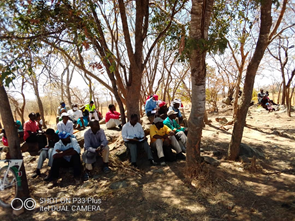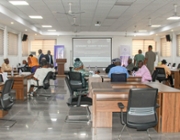Participatory budget consultations in Zimbabwe

12 October 2020
CLGF is working in Zimababwe to support the 2020 budget consultations in 31 urban and rural local authorities. This important initiative is being supported financially by the European Union, under a project entitled: Enhancing Local Authorities Contribution to Governance and Development Processes in Zimbabwe and involves the Ministry of Local Government and Public Works.
Involving vulnerable and marginalised groups in consultation
The local government budgeting cycle is underway and the easing of the Covid-19 restrictions is allowing local authorities to conduct limited face-to-face consultations with residents and citizens. These consultations are driven and inspired by the fact that most vulnerable and marginalised groups, who should be the main target of budget consultations, have limited or no access to ICT resources required for virtual consultations. In the spirit of inclusiveness and leaving no one behind, CLGF has provided financial support to the beneficiary local authorities to ensure that they are able to reach out extensively to all their citizens in various clusters of geographical configuration and special needs. The premise of the support is that sustainable local development is a function of effective economic budgeting, fair broad-based taxation and charges, citizen participation and accountability.
Strengthening budget systems and financial management
The 2020 budgeting process is a departure from traditional budget consultations that local authorities conduct with a selected group, mainly the business community and those at growth points. The new 2020 budgeting consultations are part of a robust set of interventions which seek to strengthen budget systems and financial management in local authorities. The involvement of CLGF and the Ministry of Local Government has ensured that the consultations are extensive, structured, focused and monitored. All the beneficiary local authorities are required to develop a consultation schedule, showing centres and dates, and producing a report with participation statistics and key issues raised. They are also expected to corroborate their expenditure on consultation to prove this took place as proposed. CLGF and the Ministry are using the schedules for learning and monitoring purposes.
The parameters and areas of focus for the consultations set by the Ministry included:
• 2019 budget performance feedback and challenges encountered in meeting those
expectations
• Enhanced citizens understanding of Programme Based Budgeting (PBB)
• Educating citizens on their contribution to the identification and prioritisation of
projects
• 2021 budget proposals
• Exploring strategies to improve budget performance
• Deliberating on stakeholders’ roles and responsibilities
Holding councils to account
With the easing of COVID-19 lockdown, more local authorities are beginning to set up schedules for engagement. The Ministry and CLGF are currently conducting monitoring visits to some selected local authorities, ensuring that the consultation process is effective; citizens and stakeholders are holding their councils to account; and that sustainable 2021 budgets are effective.
Rigorous training
Prior to the consultations, senior managers and mayors and chairpersons of the 31 beneficiary local authorities went through a rigorous training on the Programme Based Budgeting process and how to effectively engage their citizens.
CLGF Project Manager Leopold Bhoroma said: "The results from the local authorities which have been monitored reveal that the budget consultations are more inclusive, open and focused. This is a real step forward in the way councils set their budgets."
Murehwa Rural District Council (RDC) reached out to all their 29 wards and consulted 1046 citizens of different clusters. Kusile RDC consulted 2731 citizens across the District, Beitbridge Municipality focused on youth consultations. Kariba Municipality consulted 248 representatives of different clusters of their residents.
Back to News





